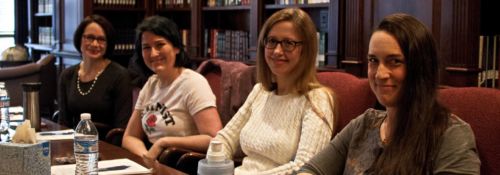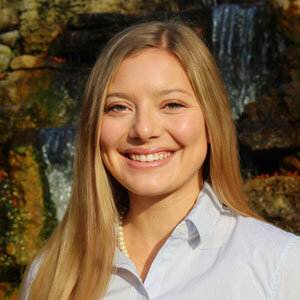
Feminism at Hillsdale: Campus Culture Thrives on Open and Honest Dialogue
Written by Corinne Prost
Hillsdale College welcomes dialogues of all kinds. The audience’s size and reception to “Feminism: A Professorial Panel” indicated that this campus holds true to its value for encouraging open and honest discourse. For several hours one evening, the Mossey Library Heritage Room waived its strict policy of silence and opened its doors to the Fairfield Society’s latest event, which included female guest speakers Dr. Lorraine Murphy, Professor Angelica Pytel, Dr. Anne Theobald, and Dr. Laury Ward. The panel had the express goal of “discuss[ing] the role and influence of feminism in modern society.”
A few minutes after seven, once the chattering simmered into broken, abrupt whispers, Mary Kate Boyle, ’20, stood before the uneven heights of the crowd to explain that the Fairfield Society was created with the aim to encourage open discussions between different civic, political, and theological perspectives. This panel was certainly an unlikely one to appear on a campus well-known for its conservative principles, and with good reason might have been met with a sparse audience. However, the sizable crowd filled the room and overflowed onto the floor surrounding the available spaces for chairs.
The four women sat at a long wooden table, politely sipping from their water bottles and smiling softly at the chatty, shuffling crowd as they exchanged a few brief comments to one another. They had sheaves of papers, notebooks, and pens arranged before them. Other than Dr. Ward’s t-shirt printed with “Feminist” in bold black lettering over a red rose, the women dressed unassumingly in business casual sweaters or blouses.
A student speaker commenced the panel with prepared questions. First on the discussion list: a definition of feminism. Dr. Theobald defined it as “a belief that men and women should be equal,” to which the others agreed. However, as Dr. Ward pointed out, none could answer what a society based around equality actually meant. Commentary thereafter defining feminism described something based on the individual primarily and considered gender roles in society secondary or unnecessary altogether.
“There are particular universals, but it is very individualized,” Dr. Pytel explained. “My dad encouraged me when I was a little girl by raising me with an attitude that women should express themselves as individuals and not conform to standards of what it means to be a ‘girl.’”
Dr. Ward responded by pointing at her shirt, explaining that her two boys also have it, and that she thinks about the “full humanity of [her] sons” so that she can help them recognize their fullest potential rather than accepting how they should act as boys.
In summation: feminism is strict individualism, so there is no way any one person “should” act or present themselves. Dr. Murphy, however, pointed out that in Christianity, men and women are made in the image of God, and yet man has headship over a woman. As a mother, a woman must play a role in her girls becoming women.
The next questions posed clarified that equality, like the idea of the individual, looks very different for each of the panelists and sometimes does not apply itself consistently to various instances. Their responses to the second question on how feminism shaped their careers and life choices made it clear that no real opportunities had been taken from them.
“If I wanted it, I did it. Period,” Dr. Pytel said.
Dr. Ward followed up with, “Feminism means something different when you’re in college and as you get older. I remember making a scathing critique on Hume in college. The professor said, ‘Don’t worry. That’s just some of her feminist stuff.’ You can dismiss something as ‘feminist’ or just because they’re women, they’re emotional. I experience feminism primarily in being a mother and the terrible state of mothering in America, especially maternity or paternity leave.”
The panelists also discussed where they saw a need for gender equality and if one should be a liberal or man-hater to be a feminist, to which all concurred that neither is necessary. As for where gender equality was needed still, the answer was “everywhere.” Dr. Murphy said, “We obviously haven’t been kept out of careers. Have I ever been told I can’t go into something because I’m a woman? Absolutely not. But I think there’s a hypersexualization of women that scares me the most.”
The panelists argued that the mentality that women are weak and subservient plagues our nation and causes issues such as doctors downplaying the pain women feel giving birth, which leads to heightened maternal mortality rates, or the speed of hurricane preparation rates being slower for those named after women than men.
To top off the hour, the panelists proposed that men should be more concerned with feminism to help shake women out of those family-oriented roles they are ingrained in culturally. Furthermore, men should allow women to step in and to make their female-specific concerns heard, such as maternity leave. As Dr. Ward put it, “If women come into positions of power, it changes the focus. Now that more women are in Congress, you hear more concerns about childcare and leave.” Perpetuation of gender-specific roles is a negative, but ignorance of the needs of those roles is negative as well.
While more explanations to the answers provided might have been desirable, by the end of the panel it was clear that valid challenges existed concerning the state of gender equality in our nation. From the gathering that the Fairfield Society accrued for this panel on feminism, I believe that our campus awaits the next open discussion on these hot-button issues eagerly.
 Corinne Prost, ’19, is an American studies major and rhetoric minor. She dreams to one day own a library so extensive that it rivals the one from Beauty and the Beast.
Corinne Prost, ’19, is an American studies major and rhetoric minor. She dreams to one day own a library so extensive that it rivals the one from Beauty and the Beast.
Published in April 2019